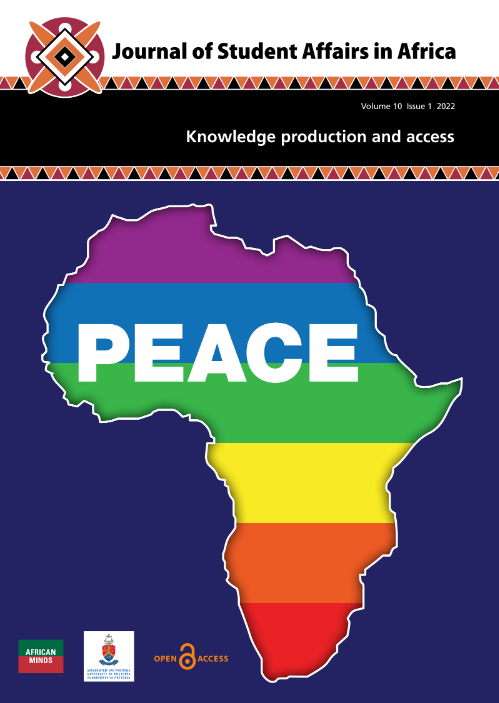Mapping African Student Affairs Research during the Past Interlude (2008-2019) through Bronfenbrenner’s Lens
DOI:
https://doi.org/10.24085/jsaa.v10i1.2524Keywords:
African student affairs, research themes, Bronfenbrenner’s Person-Process- Context-Time (PPCT) model, Council for the Advancement of Standards in Higher Education (CAS), post-graduate research and studies, African Higher Education researchAbstract
The research question we pursued was: What are the variations in the themes of research in the African higher education context that will enable researchers to promote student development? This contribution addresses three aspects of student affairs research in the African higher education context. First, it commences with tracing the African position with a document analysis of 121 student affairs research articles published in 34 peer-reviewed journals over the past interval (2008-2019). Secondly, the thematic categorization of the Council for the Advancement of Standards in Higher Education (CAS 2019) was used to determine international publication trends as derived from this document analysis. Thirdly, we applied Bronfenbrenner’s Person-Process-Context-Time (PPCT) model, as an appropriate umbrella research design and guiding framework to review the mapping of African student affairs research. From a comparison between the international CAS categorization and the African categorization, it was concluded that the CAS mapping was largely confirmed by the African analysis, with nine main themes as the foci. Additionally, it was found that four first-hand African themes have not found in the CAS categorization, and significantly limited research was conducted into post-graduate programmes and services (hereafter referred to as PGP's, despite the demands for increased enrolments. The findings suggest that more accurate and continuous mapping of the field can assist policymakers, managers and student affairs practitioners in making more informed choices on supporting growth and development in African higher education, with special emphasis on postgraduate students.
Downloads
Published
Issue
Section
License
Copyright (c) 2022 S.M. Holtzhausen, W.P. Wahl

This work is licensed under a Creative Commons Attribution-NonCommercial-ShareAlike 4.0 International License.
Authors who publish with this journal agree to the following terms:
Authors retain copyright and grant the journal right of first publication with the work simultaneously licensed under the Creative Commons Attribution Share-alike 4.0 International License that allows others to share the work with an acknowledgement of the work's authorship and initial publication in this journal.
Authors are able to enter into separate, additional contractual arrangements for the non-exclusive distribution of the journal's published version of the work (e.g., post it to an institutional repository or publish it in a book), with an acknowledgement of its initial publication in this journal.
Authors are permitted and encouraged to post their work online (e.g., in institutional repositories or on their website) prior to and during the submission process, as it can lead to productive exchanges, as well as earlier and greater citation of published work (See: The Effect of Open Access).


